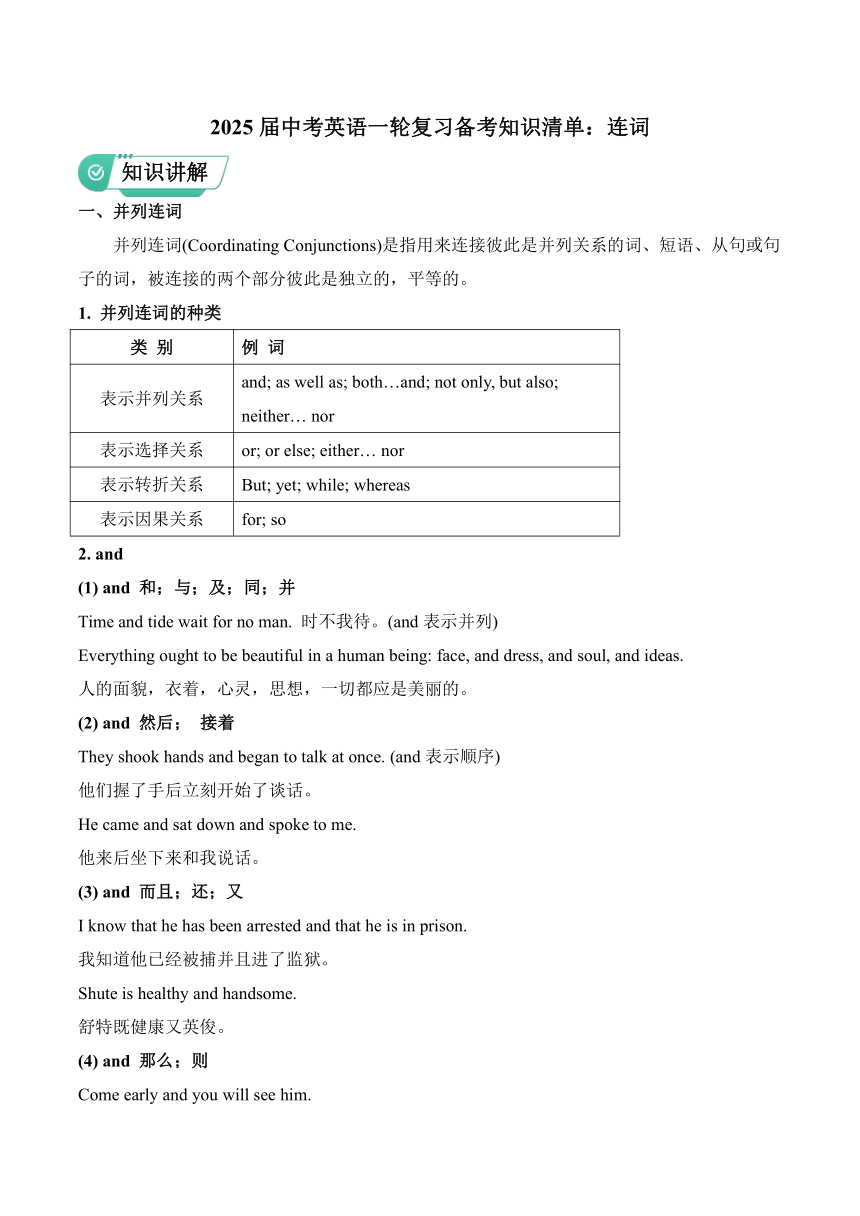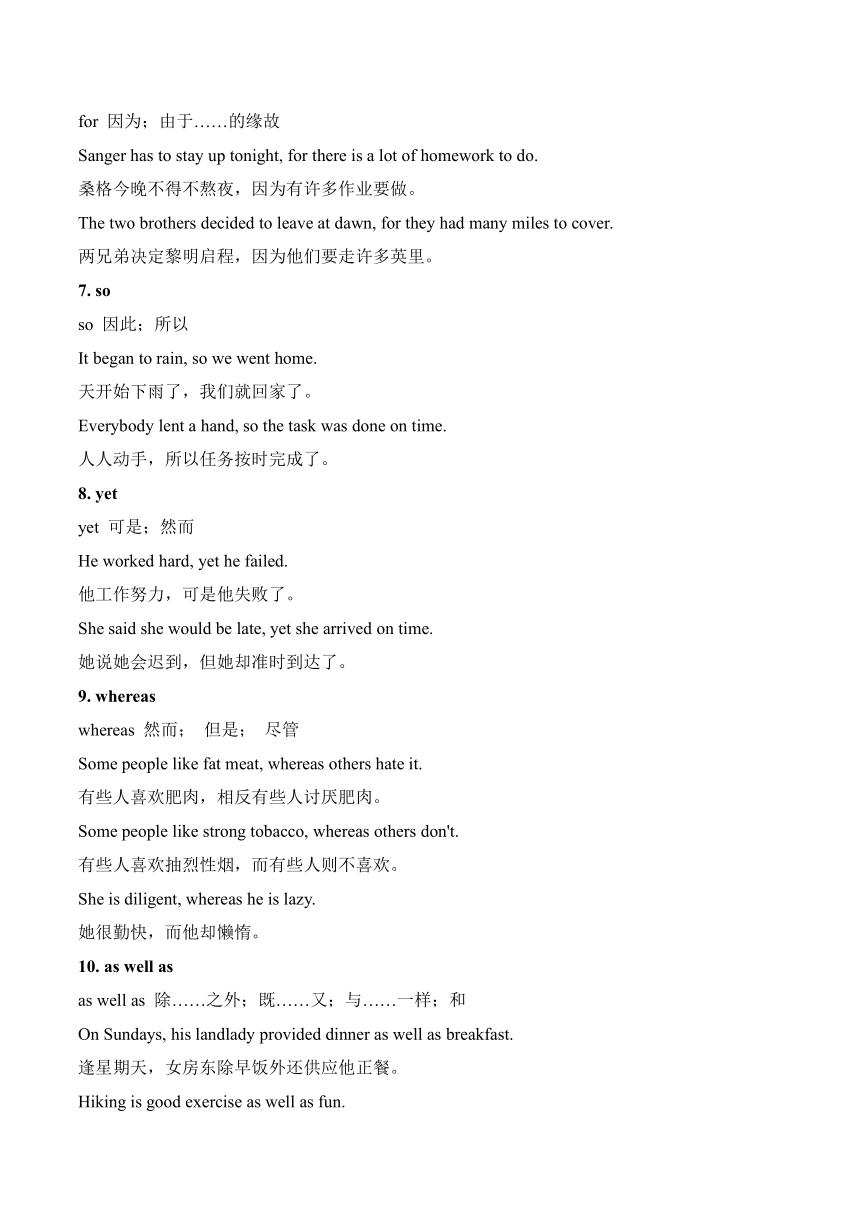2025届中考英语一轮复习备考知识清单:连词
文档属性
| 名称 | 2025届中考英语一轮复习备考知识清单:连词 |  | |
| 格式 | docx | ||
| 文件大小 | 34.2KB | ||
| 资源类型 | 教案 | ||
| 版本资源 | 通用版 | ||
| 科目 | 英语 | ||
| 更新时间 | 2024-12-12 10:39:32 | ||
图片预览



文档简介
2025届中考英语一轮复习备考知识清单:连词
知识讲解
一、并列连词
并列连词(Coordinating Conjunctions)是指用来连接彼此是并列关系的词、短语、从句或句子的词,被连接的两个部分彼此是独立的,平等的。
1. 并列连词的种类
类 别 例 词
表示并列关系 and; as well as; both…and; not only, but also; neither… nor
表示选择关系 or; or else; either… nor
表示转折关系 But; yet; while; whereas
表示因果关系 for; so
2. and
(1) and 和;与;及;同;并
Time and tide wait for no man. 时不我待。(and表示并列)
Everything ought to be beautiful in a human being: face, and dress, and soul, and ideas.
人的面貌,衣着,心灵,思想,一切都应是美丽的。
(2) and 然后; 接着
They shook hands and began to talk at once. (and表示顺序)
他们握了手后立刻开始了谈话。
He came and sat down and spoke to me.
他来后坐下来和我说话。
(3) and 而且;还;又
I know that he has been arrested and that he is in prison.
我知道他已经被捕并且进了监狱。
Shute is healthy and handsome.
舒特既健康又英俊。
(4) and 那么;则
Come early and you will see him.
早些来,那么你就会见到他了。
Try again and you will succeed.
再试一次,你就会成功。
3. but
(1) but 但是;可是;然而
She wants to go to college but her parents want her to get married.
她想念大学,但她父母希望她结婚。
The car is very old but in good condition.
这辆车旧了,但性能还不错。
(2) but (用于否定结构后) 而 (是)
Virtue dwells not in the tongue but in the heart. 看人看心不看嘴。
He didn't come to help, but to hinder us.
他不是来帮忙,而是来阻碍我们的。
4. or
(1) or 或;或者;还是
He must be mad or drunk. 他不是疯了就是喝醉了。
Scotch or Bourbon 要苏格兰威士忌还是波旁威士忌?
(2) or 否则; 要不然
Be quick, or it may be too late. 快点,不然就会迟到。
Do not move, or you are a dead man. 不要动,不然要你的命。
(3) or (用于否定句) 也不
He never smokes or drinks. 他从不抽烟,也不喝酒。
5. or else
or else 否则;要不然
Hurry up, or else you'll miss the last bus.
快点,不然你就赶不上末班车了。
Let's get moving, or else we'll miss the train.
我们走吧,不然就赶不上火车了。
6. for
for 因为;由于……的缘故
Sanger has to stay up tonight, for there is a lot of homework to do.
桑格今晚不得不熬夜,因为有许多作业要做。
The two brothers decided to leave at dawn, for they had many miles to cover.
两兄弟决定黎明启程,因为他们要走许多英里。
7. so
so 因此;所以
It began to rain, so we went home.
天开始下雨了,我们就回家了。
Everybody lent a hand, so the task was done on time.
人人动手,所以任务按时完成了。
8. yet
yet 可是;然而
He worked hard, yet he failed.
他工作努力,可是他失败了。
She said she would be late, yet she arrived on time.
她说她会迟到,但她却准时到达了。
9. whereas
whereas 然而; 但是; 尽管
Some people like fat meat, whereas others hate it.
有些人喜欢肥肉,相反有些人讨厌肥肉。
Some people like strong tobacco, whereas others don't.
有些人喜欢抽烈性烟,而有些人则不喜欢。
She is diligent, whereas he is lazy.
她很勤快,而他却懒惰。
10. as well as
as well as 除……之外;既……又;与……一样;和
On Sundays, his landlady provided dinner as well as breakfast.
逢星期天,女房东除早饭外还供应他正餐。
Hiking is good exercise as well as fun.
徒步旅行很有趣味,也是很好的锻炼。
In theory as well as in practice, the idea is unsound.
这个主意在理论上和实践上都站不住脚。
He would like to go as well as you. 他和你一样想去。
11. both ... and ...
both ... and ... 和……(两者)都; 不仅……而且; 既……又
Both Mary and Peter are washing the dishes.
玛丽和彼得都在洗盘子。
Mary both washes the dishes and dries them.
玛丽不仅洗盘子,而且把它们揩干。
Both the wheat and the barley will be shipped tomorrow.
小麦和大麦明天都要装船运走。
Chickens are raised for both meat and eggs.
养鸡既可吃肉,又可吃蛋。
12. not only...but also...
not only...but also... 不但……而且……
Such work is not only devalued in that country, its nature is widely misunderstood.
这种工作在那个国家不但被贬低,而且工作的性质也被许多人误解了。
He plays not only the piano,but also the violin.
他不仅弹钢琴,而且还拉小提琴。
He can speak not only English, but also French. 他不仅会说英语,而且会说法语。
I not only heard it,but saw it.
我不但听到而且也看到了。
注意:not only...but also... 中的 but 或 also 有时可省略;当not only ... but also ... 位于句首时,可能引起倒装。
13. either ... or ...
either...or... 或……或……;要么……要么……;不是……就是…… Either come in or go out. 要么进来,要么出去。 He is either drunk or mad. 他不是醉了就是疯了。 The criminal refused to either speak or eat. 罪犯不肯讲也不肯吃。
14. neither...nor...
neither...nor... 既不……也不……; ……和……都不
Neither Mary nor Tom came to our party yesterday.
昨天玛丽和汤姆都没来参加我们的晚会。
He neither drinks, smokes, nor eats meat.
他既不喝酒抽烟,也不吃肉。
但要注意:当neither...nor... 位于句首时,可能引起倒装。
二、从属连词
从属连词是连词的一种,用来引导名词性从句。
1. 从属连词的种类
表示时间 when(当……时);while(与……同时);as(正当……时);before(在……前);after(在……后);until(到……时候,直到……才);since(自……以来);as soon as(一……就……)
表示原因和结果 because(因为);since(既然);as(由于);so(因此)
表示条件 if(如果);unless(如果不,除非);as long as(只要)
表示让步 though, although(虽然,尽管);even if/though(即使)
表示疑问 if/whether(是否)
表示方式 as(像,如同……一样);just as(正如……一样);as if(好像)
表示比较 as...as(和……一样);not so...as(不如……);than(比……更……)
表示目的 so that(以便,为的是……)
for和because的区别:
并列连词for连接的分句只能放在句尾,前面用逗号隔开,表示补充说明或者提供推断的理由;从属连词because表示的是一种明确的因果关系,解释原因,可位于主句前,也可位于主句后,常回答why引导的问句。
2. 从属连词的用法
(1) 引导宾语从句的从属连词主要有that, if, whether等。
if引导条件状语从句,从句用一般现在时,主句用一般将来时(即主将从现)。
I'm glad that you're ready to help others. 我很高兴你乐于帮助别人。
I don't know if she has gone to Guangzhou. 我不知道她是否已经去了广州。
(2) 引导状语从句的从属连词。
①引导时间状语从句的从属连词有when, while, after, before, since, till/until, as soon as等。
We've lived here since 1994. 自1994年以来我们一直住在这里。
●when和while均可引导时间状语从句,意为“当······的时候”。when既可以引导持续性动作,又可以引导短暂性动作,而while引导的动作必须是持续性的。while还可以表示两个动作同时进行。
When he arrived home, it was just nine o'clock. 他回家时正好九点。
While she was cooking, the telephone rang.
=When she was cooking, the telephone rang.
=When the telephone rang, she was cooking.
她正在做饭时电话响了。
●since“自从……以来”,该连词所连接的从句中的谓语动词通常是过去时,主句通常是一般现在时或现在完成时。
●as soon as“一……就……”,该连词所在的句子中,若主句是一般将来时,从句要用一般现在时表示将来的意义。
●till/until引导的从句有以下两种情况:
1) 表示“直到……”,主从句都用肯定式。
2) 表示“直到……才”,主句多用非延续性动词,且谓语要用否定形式,从句用肯定形式。
I worked till it was dark. 我一直工作到天黑。
I didn't get up until my mother called me. 直到我妈妈给我打电话,我才起床。
②引导原因状语从句的从属连词有as, because, since等。
Since everybody is here, let's begin. 既然大家都在这里,我们开始吧。
③引导条件状语从句的从属连词有if, unless, as long as等。
She will not come unless he is invited. 除非被邀请,否则她是不会来的。
④引导目的状语从句的从属连词有so that, in order that等。
She left early so that she could catch the early bus.
她早早地离开了以便能赶上早班车。
⑤引导结果状语从句的从属连词有so/such... that...等。
such...that与so...that的区别:
●such是形容词,它所修饰的名词可以是可数名词,也可以是不可数名词;名词前面可以带形容词,也可以不带。如果其后是单数可数名词,前面要加不定冠词a或an。
因此,such...that的句型结构可分为以下三种:
1) such+ a/an+adj.+可数名词单数+ that从句
She is such a clever girl that she can work out the math problem quickly.
她是如此聪明的一个女孩,能很快解出数学问题。
2) such+ adj.+可数名词复数+that从句
They are such exciting movies that I want to watch them again.
它们是如此让人兴奋的电影,以至于我还想再看一次。
3) such+adj.+不可数名词+that从句
It was such bad weather that I could not go out. 天气如此糟糕,我不能外出了。
●so是副词,与形容词或副词连用,其结构是:so+adj./adv.+that从句。
He ran so fast that I couldn't catch up with him.
他跑得如此快,以至于我追不上他。
⑥引导让步状语从句的从属连词有though, although, even if/though, no matter how/what等。
●由though, although引导的让步状语从句,后面的主句不能有but,但可以用yet, still等。
Although/Though it's hard work, yet I still enjoy it.
尽管这是一份差事,但我很愿意干。
●wh-ever等疑问词可以引导让步状语从句,有时可与“no matter+ wh-”引导的让步状语从句互换。
Whatever/No matter what you do, you should do it well.
不管你做什么事,都要做好。
(2) 引导其他从句的从属连词。
that, who, whom, which, when, where, why等可以引导主语从句、表语从句和定语从句。
When the new museum will be open to the public has not been made clear. (主语从句)
这座新的博物馆何时向公众开放还没有确定下来。
知识讲解
一、并列连词
并列连词(Coordinating Conjunctions)是指用来连接彼此是并列关系的词、短语、从句或句子的词,被连接的两个部分彼此是独立的,平等的。
1. 并列连词的种类
类 别 例 词
表示并列关系 and; as well as; both…and; not only, but also; neither… nor
表示选择关系 or; or else; either… nor
表示转折关系 But; yet; while; whereas
表示因果关系 for; so
2. and
(1) and 和;与;及;同;并
Time and tide wait for no man. 时不我待。(and表示并列)
Everything ought to be beautiful in a human being: face, and dress, and soul, and ideas.
人的面貌,衣着,心灵,思想,一切都应是美丽的。
(2) and 然后; 接着
They shook hands and began to talk at once. (and表示顺序)
他们握了手后立刻开始了谈话。
He came and sat down and spoke to me.
他来后坐下来和我说话。
(3) and 而且;还;又
I know that he has been arrested and that he is in prison.
我知道他已经被捕并且进了监狱。
Shute is healthy and handsome.
舒特既健康又英俊。
(4) and 那么;则
Come early and you will see him.
早些来,那么你就会见到他了。
Try again and you will succeed.
再试一次,你就会成功。
3. but
(1) but 但是;可是;然而
She wants to go to college but her parents want her to get married.
她想念大学,但她父母希望她结婚。
The car is very old but in good condition.
这辆车旧了,但性能还不错。
(2) but (用于否定结构后) 而 (是)
Virtue dwells not in the tongue but in the heart. 看人看心不看嘴。
He didn't come to help, but to hinder us.
他不是来帮忙,而是来阻碍我们的。
4. or
(1) or 或;或者;还是
He must be mad or drunk. 他不是疯了就是喝醉了。
Scotch or Bourbon 要苏格兰威士忌还是波旁威士忌?
(2) or 否则; 要不然
Be quick, or it may be too late. 快点,不然就会迟到。
Do not move, or you are a dead man. 不要动,不然要你的命。
(3) or (用于否定句) 也不
He never smokes or drinks. 他从不抽烟,也不喝酒。
5. or else
or else 否则;要不然
Hurry up, or else you'll miss the last bus.
快点,不然你就赶不上末班车了。
Let's get moving, or else we'll miss the train.
我们走吧,不然就赶不上火车了。
6. for
for 因为;由于……的缘故
Sanger has to stay up tonight, for there is a lot of homework to do.
桑格今晚不得不熬夜,因为有许多作业要做。
The two brothers decided to leave at dawn, for they had many miles to cover.
两兄弟决定黎明启程,因为他们要走许多英里。
7. so
so 因此;所以
It began to rain, so we went home.
天开始下雨了,我们就回家了。
Everybody lent a hand, so the task was done on time.
人人动手,所以任务按时完成了。
8. yet
yet 可是;然而
He worked hard, yet he failed.
他工作努力,可是他失败了。
She said she would be late, yet she arrived on time.
她说她会迟到,但她却准时到达了。
9. whereas
whereas 然而; 但是; 尽管
Some people like fat meat, whereas others hate it.
有些人喜欢肥肉,相反有些人讨厌肥肉。
Some people like strong tobacco, whereas others don't.
有些人喜欢抽烈性烟,而有些人则不喜欢。
She is diligent, whereas he is lazy.
她很勤快,而他却懒惰。
10. as well as
as well as 除……之外;既……又;与……一样;和
On Sundays, his landlady provided dinner as well as breakfast.
逢星期天,女房东除早饭外还供应他正餐。
Hiking is good exercise as well as fun.
徒步旅行很有趣味,也是很好的锻炼。
In theory as well as in practice, the idea is unsound.
这个主意在理论上和实践上都站不住脚。
He would like to go as well as you. 他和你一样想去。
11. both ... and ...
both ... and ... 和……(两者)都; 不仅……而且; 既……又
Both Mary and Peter are washing the dishes.
玛丽和彼得都在洗盘子。
Mary both washes the dishes and dries them.
玛丽不仅洗盘子,而且把它们揩干。
Both the wheat and the barley will be shipped tomorrow.
小麦和大麦明天都要装船运走。
Chickens are raised for both meat and eggs.
养鸡既可吃肉,又可吃蛋。
12. not only...but also...
not only...but also... 不但……而且……
Such work is not only devalued in that country, its nature is widely misunderstood.
这种工作在那个国家不但被贬低,而且工作的性质也被许多人误解了。
He plays not only the piano,but also the violin.
他不仅弹钢琴,而且还拉小提琴。
He can speak not only English, but also French. 他不仅会说英语,而且会说法语。
I not only heard it,but saw it.
我不但听到而且也看到了。
注意:not only...but also... 中的 but 或 also 有时可省略;当not only ... but also ... 位于句首时,可能引起倒装。
13. either ... or ...
either...or... 或……或……;要么……要么……;不是……就是…… Either come in or go out. 要么进来,要么出去。 He is either drunk or mad. 他不是醉了就是疯了。 The criminal refused to either speak or eat. 罪犯不肯讲也不肯吃。
14. neither...nor...
neither...nor... 既不……也不……; ……和……都不
Neither Mary nor Tom came to our party yesterday.
昨天玛丽和汤姆都没来参加我们的晚会。
He neither drinks, smokes, nor eats meat.
他既不喝酒抽烟,也不吃肉。
但要注意:当neither...nor... 位于句首时,可能引起倒装。
二、从属连词
从属连词是连词的一种,用来引导名词性从句。
1. 从属连词的种类
表示时间 when(当……时);while(与……同时);as(正当……时);before(在……前);after(在……后);until(到……时候,直到……才);since(自……以来);as soon as(一……就……)
表示原因和结果 because(因为);since(既然);as(由于);so(因此)
表示条件 if(如果);unless(如果不,除非);as long as(只要)
表示让步 though, although(虽然,尽管);even if/though(即使)
表示疑问 if/whether(是否)
表示方式 as(像,如同……一样);just as(正如……一样);as if(好像)
表示比较 as...as(和……一样);not so...as(不如……);than(比……更……)
表示目的 so that(以便,为的是……)
for和because的区别:
并列连词for连接的分句只能放在句尾,前面用逗号隔开,表示补充说明或者提供推断的理由;从属连词because表示的是一种明确的因果关系,解释原因,可位于主句前,也可位于主句后,常回答why引导的问句。
2. 从属连词的用法
(1) 引导宾语从句的从属连词主要有that, if, whether等。
if引导条件状语从句,从句用一般现在时,主句用一般将来时(即主将从现)。
I'm glad that you're ready to help others. 我很高兴你乐于帮助别人。
I don't know if she has gone to Guangzhou. 我不知道她是否已经去了广州。
(2) 引导状语从句的从属连词。
①引导时间状语从句的从属连词有when, while, after, before, since, till/until, as soon as等。
We've lived here since 1994. 自1994年以来我们一直住在这里。
●when和while均可引导时间状语从句,意为“当······的时候”。when既可以引导持续性动作,又可以引导短暂性动作,而while引导的动作必须是持续性的。while还可以表示两个动作同时进行。
When he arrived home, it was just nine o'clock. 他回家时正好九点。
While she was cooking, the telephone rang.
=When she was cooking, the telephone rang.
=When the telephone rang, she was cooking.
她正在做饭时电话响了。
●since“自从……以来”,该连词所连接的从句中的谓语动词通常是过去时,主句通常是一般现在时或现在完成时。
●as soon as“一……就……”,该连词所在的句子中,若主句是一般将来时,从句要用一般现在时表示将来的意义。
●till/until引导的从句有以下两种情况:
1) 表示“直到……”,主从句都用肯定式。
2) 表示“直到……才”,主句多用非延续性动词,且谓语要用否定形式,从句用肯定形式。
I worked till it was dark. 我一直工作到天黑。
I didn't get up until my mother called me. 直到我妈妈给我打电话,我才起床。
②引导原因状语从句的从属连词有as, because, since等。
Since everybody is here, let's begin. 既然大家都在这里,我们开始吧。
③引导条件状语从句的从属连词有if, unless, as long as等。
She will not come unless he is invited. 除非被邀请,否则她是不会来的。
④引导目的状语从句的从属连词有so that, in order that等。
She left early so that she could catch the early bus.
她早早地离开了以便能赶上早班车。
⑤引导结果状语从句的从属连词有so/such... that...等。
such...that与so...that的区别:
●such是形容词,它所修饰的名词可以是可数名词,也可以是不可数名词;名词前面可以带形容词,也可以不带。如果其后是单数可数名词,前面要加不定冠词a或an。
因此,such...that的句型结构可分为以下三种:
1) such+ a/an+adj.+可数名词单数+ that从句
She is such a clever girl that she can work out the math problem quickly.
她是如此聪明的一个女孩,能很快解出数学问题。
2) such+ adj.+可数名词复数+that从句
They are such exciting movies that I want to watch them again.
它们是如此让人兴奋的电影,以至于我还想再看一次。
3) such+adj.+不可数名词+that从句
It was such bad weather that I could not go out. 天气如此糟糕,我不能外出了。
●so是副词,与形容词或副词连用,其结构是:so+adj./adv.+that从句。
He ran so fast that I couldn't catch up with him.
他跑得如此快,以至于我追不上他。
⑥引导让步状语从句的从属连词有though, although, even if/though, no matter how/what等。
●由though, although引导的让步状语从句,后面的主句不能有but,但可以用yet, still等。
Although/Though it's hard work, yet I still enjoy it.
尽管这是一份差事,但我很愿意干。
●wh-ever等疑问词可以引导让步状语从句,有时可与“no matter+ wh-”引导的让步状语从句互换。
Whatever/No matter what you do, you should do it well.
不管你做什么事,都要做好。
(2) 引导其他从句的从属连词。
that, who, whom, which, when, where, why等可以引导主语从句、表语从句和定语从句。
When the new museum will be open to the public has not been made clear. (主语从句)
这座新的博物馆何时向公众开放还没有确定下来。
